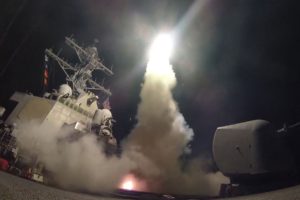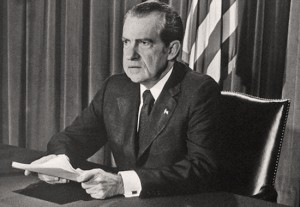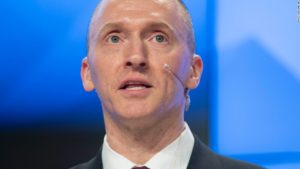The Scandal Hidden Behind Russia-gate
Official Washington has the Russia-gate scandal almost 180-degrees wrong; it is not about protecting democracy, but about pushing Americans into more wars, the true scandal that is being missed, writes Daniel Lazare.
By Daniel Lazare
The Washington Post and New York Times editors are trying to relive the glory days of their youth by comparing Trump’s firing of FBI chief James Comey to Richard Nixon’s Saturday Night Massacre at the height of Watergate. Donald Trump, it seems, is a threat to democracy just as Tricky Dick was more than 40 years ago, so the only thing that can save us is a special prosecutor who will get to the bottom of Russia-gate once and for all.
Difference No. 1: Watergate was about a real event, the June 17, 1972, break-in at the Democratic National Committee’s offices at the Watergate Hotel in which five people were caught red-handed in the act. The fireworks began when the burglars turned out to be part of a special security operation known as the White House Plumbers.But not only is this nonsense, it’s pernicious nonsense that itself amounts to a cover-up. Here’s how Russia-gate is not the same as Watergate and why, in fact, it’s the opposite:
This is why Special Prosecutor Archibald Cox ran into a buzz-saw in October 1973. After months of gumshoe field work, he had begun zeroing in on evidence linking the Plumbers with the Oval Office. This was a bridge too far from Nixon’s point of view, and so he ordered him canned.
Cox was thus operating in the realm of hard, cold, tangible fact. But Russia-gate is different since the alleged crime that is at heart of the scandal – last summer’s reported data break-in at the DNC – is so far based on purest speculation. No burglars have been apprehended, no links have been clearly established with the reputed masterminds in Moscow, while Wikileaks continues to insist that the email disclosure was not a hack by outside intelligence operatives at all, but a leak by a “disgusted” insider.
Since the FBI has never conducted an independent investigation – for as-yet-unexplained reasons, the DNC refused to grant it access to its servers despite multiple requests – the only evidence that a break-in even occurred comes from a private cyber-security firm, CrowdStrike Inc. of Irvine, California, that the DNC hired to look into the breach.
Since when do the cops rely on a private eye to look into a murder rather than performing an investigation of their own? CrowdStrike, moreover, turns out to be highly suspect. Not only is Dmitri Alperovich, its chief technical officer, a Russian émigré with a pronounced anti-Putin tilt, but he is also an associate of a virulently anti-Russian outfit known as the Atlantic Council, a Washington think tank funded by the Saudis, the United Arab Emirates, the Ukrainian World Congress, the U.S. State Department and a variety of other individuals and groups that have an interest in isolating or discrediting Russia.
The Atlantic Council puts out a stream of anti-Kremlin articles and reports with scary headlines like “Distract Deceive Destroy: Putin at War in Syria” and “Six Immediate Steps to Stop Putin’s Aggression.”
Since the Atlantic Council is also a long-time supporter of Hillary Clinton, this means that the Clinton campaign relied on a friendly anti-Putin cyber-sleuth to tell it what everyone involved wanted to hear, i.e. that the Kremlin was at the bottom of it all. If this strikes you as fishy, it should.
Crowdstrike’s findings seemed weak in other respects as well. A few days after determining that Russian intelligence was responsible, Alperovich issued a memo praising the hackers to the skies. “Their tradecraft is superb, operational security second to none and the extensive usage of ‘living-off-the-land’ techniques enables them to easily bypass many security solutions they encounter,” he wrote. Since the hackers were brilliant, CrowdStrike had to be even more so to track them down and expose their perfidy for all to see.

Former Secretary of State Hillary Clinton speaking at an Atlantic Council event in 2013. (Photo credit: Atlantic Council)
But CrowdStrike then said it was able to pin it on the Russians because the hackers had made certain elementary mistakes, most notably uploading a document in a Russian-language format under the name “Felix Edmundovich,” an obvious reference to Felix E. Dzerzhinsky, founder of the Cheka, as the Soviet political police were originally known.
It was the equivalent of American intelligence agents uploading a Russian document under the name “J. Edgar.” Since this was obviously very careless of them, it raised an elementary question: how could the hackers be super-sophisticated yet at the same time guilty of an error that was unbearably dumb?
The skeptics promptly pounced. Referring to Russia’s two top intelligence agencies, a well-known cyber-security expert named Jeffrey Carr was unable to restrain his sarcasm: “OK. Raise your hand if you think that a GRU or FSB officer would add Iron Felix’s name to the metadata of a stolen document before he released it to the world while pretending to be a Romanian hacker. Someone clearly had a wicked sense of humor.”
Since scattering such false leads is child’s play for even a novice hacker, it was left to John McAfee, founder of McAfee Associates and developer of the first commercial anti-virus software, to draw the ultimate conclusion. “If it looks like the Russians did it,” he told TV interviewer Larry King, “then I can guarantee you: it was not the Russians.”
None of this proves that the Russians didn’t hack the DNC. All it proves is that evidence is lacking. If all 17 U.S. intelligence agencies agree that the Kremlin did it, it is worth bearing in mind that the “intelligence community” was equally unanimous in 2002 that Saddam Hussein possessed weapons of mass destruction. If they were wrong then, why should anyone believe that they are right now in the absence of clear and unequivocal evidence? (On Monday, former Director of National Intelligence James Clapper clarified that the repeated claim about the unanimous view of the 17 agencies was wrong; that the report, which he released on Jan. 6, was the work of hand-picked analysts from the CIA, the FBI and the National Security Agency.)
So, where Cox was dealing with a real live burglary, all we have today is smoke and mirrors.
Difference No. 2: Russia-gate is not about democracy but about neo-McCarthyism and war.
For all the self-serving hoopla and mythology surrounding Watergate, the scandal was ultimately about something important: the dirty tricks and lawless authoritarianism that were advancing smartly under the Nixon administration. But Russia-gate is not about democracy. Rather, it is about an inside-the-beltway battle over the direction of U.S.-Russian relations.
The battle is deadly serious. Since roughly 2008, Cold War II has expanded steadily to the point where it now extends along a 1,300-mile front from Estonia to the Crimea plus the Caucasus and major portions of the Middle East. It has intensified as well and would likely have reached a flashpoint if the hawkish Hillary Clinton had been elected.
But Trump’s surprise victory threw a wrench into the works. This is not to say that Donald Trump is a latter-day Mahatma Gandhi out to bring peace and brotherhood to the world. To the contrary, he’s a loud-mouthed ignoramus who can barely find Russia on the map. But amid all his confused mutterings about foreign policy, one thing that has come through loud and clear is his desire for a rapprochement with Russia.
Given the mounting war fever that has gripped Washington for the last ten years or so, this is nothing short of explosive. Once it became clear in the early morning hours of Nov. 9 that Trump was White House-bound, the pro-war establishment therefore went into overdrive. Every effort was made to undermine the President-elect’s legitimacy.
Evidence was dug up purporting to show that he had colluded with the Kremlin. A Democratic-funded memo by a British intelligence officer named Christopher Steele was produced claiming that Russian intelligence had a video of him cavorting with prostitutes in Moscow’s Ritz Carlton.
But it’s all so much hot air. Nothing of substance has turned up. A 1,700-word front-page exposé about Trump campaign aide Carter Page that The New York Times ran on April 20 was typical. A study in innuendo and unsubstantiated assertions, it said that the FBI became concerned when it learned that “a Russian spy” had tried to recruit him during a visit to Moscow in 2013. But then it disclosed that Page, an academic and energy entrepreneur, had no idea that the person was a spy and merely thought he was talking business with an ordinary diplomatic attaché with Russia’s U.N. mission.
It’s a mistake that any American businessman could make, whether in Moscow or in London or Tel Aviv. “It is unclear,” the Times went on, “exactly what about Mr. Page’s visit drew the FBI’s interest: meetings he had during his three days in Moscow, intercepted communications of Russian officials speaking about him, or something else.”
But one thing that apparently caused ears to prick up was a talk he gave at a Russian economics institute. The reason according to the Times is that it: “criticized American policy toward Russia in terms that echoed the position of President Vladimir V. Putin of Russia, declaring, ‘Washington and other Western capitals have impeded potential progress through their often hypocritical focus on ideas such as democratization, inequality, corruption and regime change.’ His remarks accorded with Mr. Trump’s positive view of the Russian president, which had prompted speculation about what Mr. Trump saw in Mr. Putin – more commonly denounced in the United States as a ruthless, anti-Western autocrat.”
In other words, Page drew official notice because he dared to differ with the orthodox view of Putin as a latter-day Lucifer. As a consequence, he now finds himself at the center of what the Times describes as “a wide-ranging investigation, now accompanied by two congressional inquiries, that has cast a shadow over the early months of the Trump administration.” So, out of nothing (or at least very little) has grown something very, very large, an absurd pseudo-scandal that now has Democrats gobbling on about special prosecutors and impeachment.
But even though there’s no clear “there” there, the Washington scandal machine has a way of feeding on itself regardless. As Consortium News’ Robert Parry has pointed out (see “The McCarthyism of Russia-gate,” May 7), the Senate Intelligence Committee hit Page with a sweeping order on April 28 to turn over anything and everything having to do with his extensive list of Russian business, personal and casual contacts for the 18 months prior to Trump’s Inauguration.
The order thus informs Page that he must turn over “[a] list of all meetings between you and any Russian official or representative of Russian business interests which took place between June 16, 2015, and January 20, 2017 … all meetings of which you are aware between any individual with the Trump campaign and any Russian official or representative of Russian business interests … [a]ll communications records, including electronic communications records such as e-mail or text messages, written correspondence, and phone records of communications … to which you and any Russian official or representative of Russian business interests was a party,” and so on and so forth.
Considering that Page lived in Russia for several years, the request is virtually impossible. It thus “amounts to a perjury trap,” Parry notes, “because even if Page tried his best to supply all the personal, phone, and email contacts, he would be sure to miss something or someone, thus setting him up for prosecution for obstructing an investigation or lying to investigators.”
It also amounts to a self-fueling scandal machine since if Page falls short in any respect, the result will be fuel for a dozen outraged Times and Washington Post editorials accusing the Trump team of covering up. If the investigation into Monical Lewinsky’s little blue dress was a joke, this will be even worse, a scandal without end resting ultimately on thin air.
But to what end? The goal, simply, is to drive Trump out of office or, barring that, to force him to adopt a more warlike foreign policy. The effort has already borne fruit in the form of the April 6 Tomahawk missile strike at a Syrian government airbase that Trump launched less to punish Bashar al-Assad than to get the Democrats, the press, the neocons, and other members of the war camp off his back. The press reception was rapturous, and after labeling Trump a Kremlin stooge on a near-daily basis, Democrats like Chuck Schumer, Nancy Pelosi, and Dick Durbin responded by patting him fondly on the back.

The guided-missile destroyer USS Porter conducts strike operations while in the Mediterranean Sea, April 7, 2017. (Navy photo by Petty Officer 3rd Class Ford Williams)
The more such actions he launches, the more approving such paragons of democracy will become. With amazing accuracy, the Democrats have zeroed in on the one halfway positive thing Trump had to say during his campaign and made it their chief target.
Difference No. 3: Where Watergate was about blocking a cover-up, Russia-gate is about perpetuating one.
Hours after Comey received his termination notice, Ken Gude, a senior fellow at the Center for American Progress, published an article calling on the Justice Department to “appoint a special counsel to lead the investigation into links between the Trump campaign and the Russian government, and whether there was any coordination between the campaign and Russia’s efforts to interfere with the election.”
This was very neutral, objective, and high-minded of him. But the question to ask in this instance is cui bono – who benefits? The answer lies in what the Center for American Progress is and whom it represents.
The answer is that CAP is a major Clinton stronghold. Its founder is John Podesta, who was Clinton’s campaign chairman and whose brother, Tony, is a registered Saudi lobbyist. Its president is Neera Tanden, a long-time Clinton friend and adviser.
Major funders include George Soros and the United Arab Emirates, which, like Saudis, has long pushed for the U.S. to adopt a more militant posture vis-à-vis Iran, Syria’s Assad government, and Russia, which is allied with both. This means more sabre-rattling towards Moscow, more weapons and support for Saudi-funded jihadis in Syria, and more U.S. backup for the Saudi-UAE war against Yemen, in which more than 10,000 people have died, according to U.N. estimates, and much of the population is on the brink of mass starvation.
This is the real scandal that Russia-gate is designed to cover up. Like any country, Russia wants to steer U.S. foreign policy in a direction favorable to interests. But it’s a very small player in Washington compared to giants like Saudi Arabia, the UAE, and Qatar. These are nations that have given millions to the Clinton Foundation, to the “William J. Clinton Presidential Center and Park” in Little Rock, Arkansas (recipient of a $10-million gift from the Saudi royal family), universities like Harvard and Georgetown, and a slew of think tanks, not just CAP and the Atlantic Council, but the Center for Strategic and International Studies and Brookings, the recipient of a $14.8-million contribution from Qatar.
The oil monarchies have thus used their petro-wealth to create a pro-war consensus in Washington that is nearly 100-percent complete. Needless to say, this will not benefit the mass of ordinary Americans, the people who will have to fight and die in such conflicts and whose taxes will pay for them. Instead, it will benefit the oil companies and arms manufacturers with whom the oil monarchies are closely allied, not to mention hawkish politicians hoping to use war fever to propel their careers to ever greater heights.
They will benefit because they have sold U.S. foreign policy to the highest bidder. This is a scandal of the first order. But rather than exposing it, Russia-gate is all about covering it up.
Daniel Lazare is the author of several books including The Frozen Republic: How the Constitution Is Paralyzing Democracy (Harcourt Brace).
https://consortiumnews.com/2017/05/11/the-scandal-hidden-behind-russia-gate/



0 Comments:
Post a Comment
Subscribe to Post Comments [Atom]
<< Home